#berserk villain
Explore tagged Tumblr posts
Text
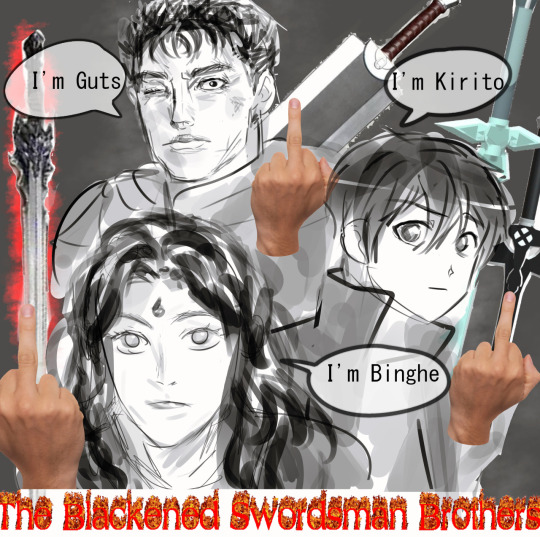
just gonna leave this here.
If you’re wondering who the other two are, read this
(semi-related to my Bingqiu Jinlan City Reunion Weeb AU fic)
#artists on tumblr#does anybody see my vision?#digital art#svsss#luo binghe#funny memes#scum villain self saving system#mxtx svsss#scumbag self saving system#scum villian self saving system#scum villains self saving system#scum villain#scumbag system#scumbag villain#guts berserk#berserk#kirito#sword art online#SAo#kazuto kirigaya
176 notes
·
View notes
Text
the three types of sci-fi: Blindsight: wouldn't it be fucked up if the universe had no meaning? Children of Time: wouldn't it be cool if the universe had no meaning and we get to find our own? Exordia: wouldn't it be fucked up if the universe had meaning?
#Exordia#Blindsight#children of time#yeah I just finished Exordia#it was A LOT#Iruvage worst villain ever?#like forget TLT John or Berserk Griffith#those guys started with the best intentions but were trapped in a spiral of despair and madness#Iruvage is just maximally consciously and calculatedly vile from the start#Exordia is a good counter-argument to the idea that a universe without soul or meaning would necessarily be worse for it
102 notes
·
View notes
Text



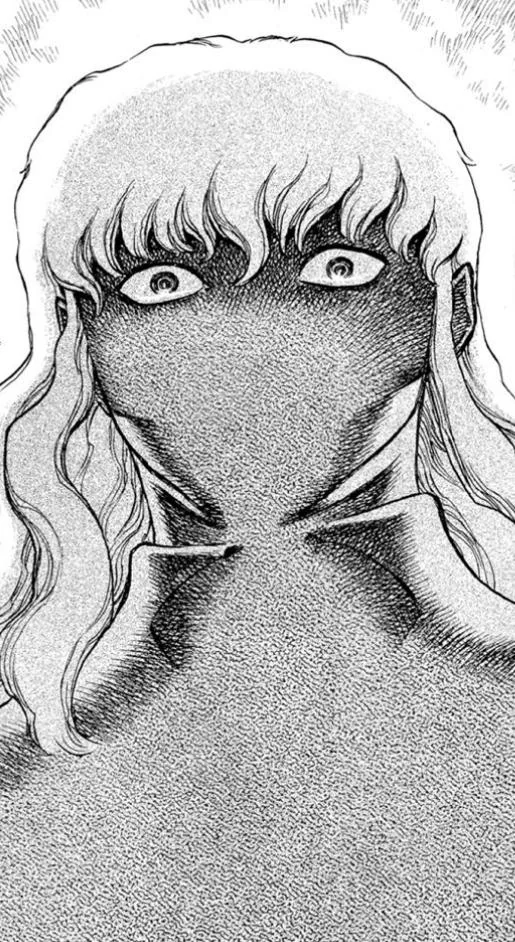

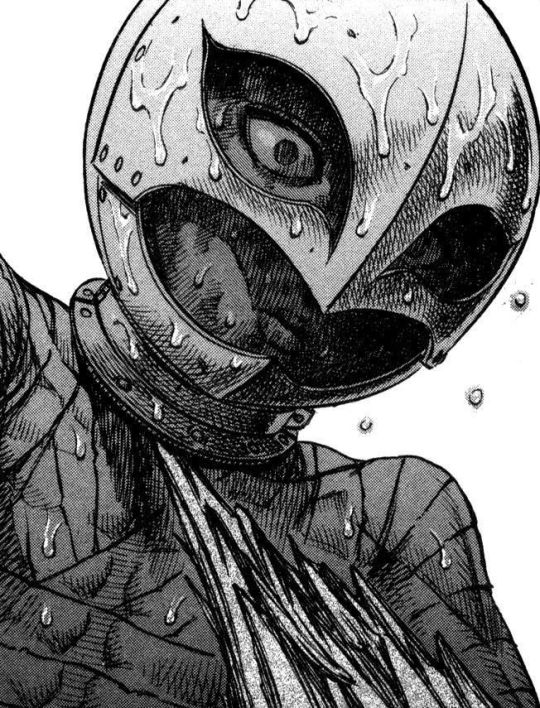




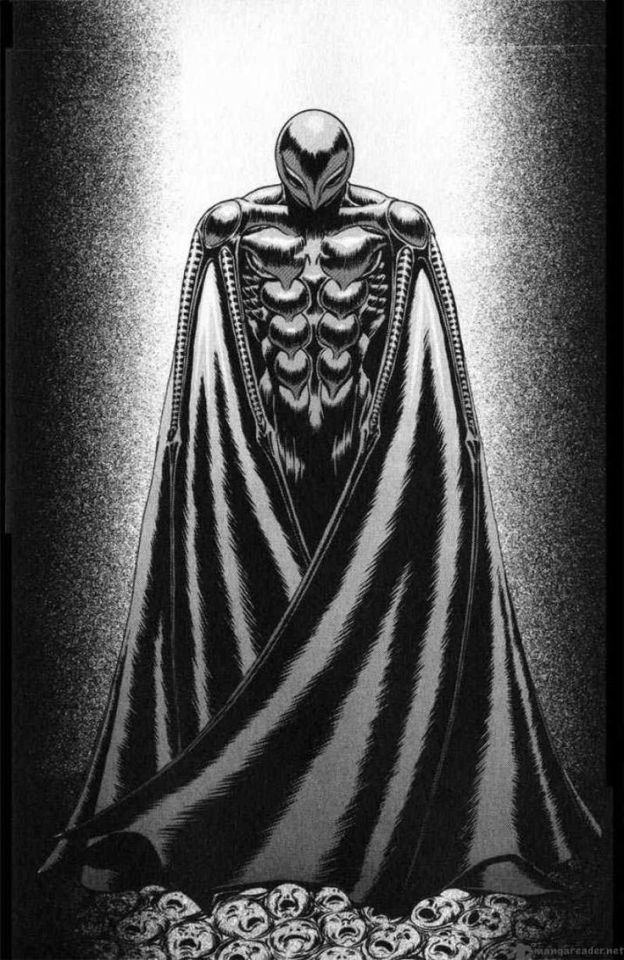
Griffith Appreciation Post (Remastered Edition)
I've become captivated by this multifaceted, vile, and selfish bastard recently.
#griffith#femto#berserk#complete monster#smug snake#tragic villain#mercenary#evil entity#demons#tyrant#great villain#NIGHTMARE FUEL
40 notes
·
View notes
Text

#Berserk#berserk#Griffith#griffith#berserk anime#anime charecter#anime#anime arts#anime art#digital art#manga#manga art#art#berserk manga#villain#The white Falcon
101 notes
·
View notes
Photo

Just wanted to share this amazing Zod fanart. - (u/Muskrato)
#Berserk#fan art#anime fanart#Zod#fanart#DC Comics#Superman#villain#comic art#digital art#illustration#superhero#art#fandom#character design#creative
27 notes
·
View notes
Text

The falcon of darkness light
Reblog if u wish to support a small artist :)
#art#one of my favorite villains of all time#he looks like#such an angel#berserk art#berserk fanart#berserk#berserk manga#berserk griffith#griffith#griffith fanart#kentaro miura#artists on tumblr#ink drawing#anime and manga#manga
34 notes
·
View notes
Text
Why are all the top 10 anime villains lists always just 5 mass murderers, 2 child abusers, a pedo, a rapist and a teenage volleyball player
#I look at the lists and I'm so confused#why is oikawa there 😭😭😭#anime#manga#villain#haikyuu#oikawa tooru#csm#chainsaw man#makima#berserk#griffith
21 notes
·
View notes
Text
youtube
let me announce the best boy here, I totally fell for his dark truw side. I want to scream "its literally me in my bad times" but I didn't commit murders for the sake of attention from my shitty father (and revenge ofc)
#goro akechi#persona 5 royal#fuck looks like i am gonna spend money and buy a figurine of him or Futaba#it's time for cheapest food again][]]]]a'a'a'a#Youtube#Akechi went from low budget Yagami Light to fucking berserk and charismatic villain#Atlus did a great job with characters#but huge palaces still suck#WHY NOBODY LOVES MAKOTO SHE IS SO COOL#also music in Shido's palace is so good#youtube#not my video
11 notes
·
View notes
Text
Me, reading and watching Demon Slayer for the first time: Wow this is amazing
The anime community: it’s actually not tho. Demon Slayer is so mid
Me: Oh… I guess so. I was probably just caught up in the hype
Me, rewatching seasons 1-3, and watching season 4 as it comes out: This is the most entertaining thing in the world, actually
#WHAT DO THEY MEAN MID#seriously the anime community is so annoying#‘it’s not as good as berserk’ SO??#WHO TF CARES ABOUT BERSERK#THATS A WHOLE OTHER ANIME DAWG#WE AINT TALKING BOUT OTHER ANIME#They are so pretentious#demon slayer is an amazing series#and I will stand by this#that one YouTube video that pops up when you search demon slayer#that’s titled something like ‘Demon Slayer is a disgrace’#is so weird. like#why? you’re angry because of a few plot holes?#because things weren’t explained as much as you wanted#because the villain DARES to not be as smart as Aizen or father?#like they say muzan is stupid as a dig at the show#LIKE YA OBVIOUSLY HES STUPID AS SHIT. THATS THE POINT#HES SO STUPID BECAUSE HE NEVER NEEDED TO BE SMART#HE WAS BASICALLY IMMORTAL#but he was also greedy#and that’s why he’s trying to find a way to survive the sun#and his stupidity and greediness are clashing#ok rant in tags over#demon slayer#muzan#kimetsu no yaiba#ds#kny#muzan kibutsuji#group think is getting to me
23 notes
·
View notes
Text
So I found Reason's concept art (along with a few other things from different shows)
I got this after I put Rhyme's concept art into google's search image thingy
#What is that thang#wordgirl#wordgirl villains#reason#wordgirl archive#wordgirl concept art#going berserk over the fact that they had butterfly symbols
9 notes
·
View notes
Text
I cant believe reddit has reached the level of "marika has had to be raped by hornsent because berserk reference"
#the gist of it is that they SA'd her and gave her the equivalent of the seedbed curse and thats why all her kids are fucked up#and 'it'd fit the berserk theme of accurses child aka guts being used for the ascension of the demonic villain aka griffith#where guts in this situation would be radahn/mohg and griffith miquella#💀
19 notes
·
View notes
Text
One Villainous Scene - "I Want Wings"
I feel like at this point in time everyone is familiar with Berserk and who Griffith is. If not, then allow me to summarize his character to the best of my abilities. He's a young, selfish, arrogant, and ambitious young man who rose from nothing and desired to one day to rule a kingdom of his own. He's a manipulative bastard in the purest sense, but never an outright villain until everything that could wrong for him went wrong for him. Griffith was captured and tormented for a year after making a major blunder immediately after having a falling out with his friend, Guts. He blamed his former friend for his misfortune, and eventually tried to kill himself which just so happened to catch the attention of some very demonic beings. Tempted by the offer of power and a new body, Griffith sold the souls of his allies and began to willingly undergo a metamorphosis into the worst possible version of himself, a true irredeemably vile monster.
This cut sequence from the manga displays exactly what went on in his head during this metamorphosis, and honestly it's the perfect summarization of his character.












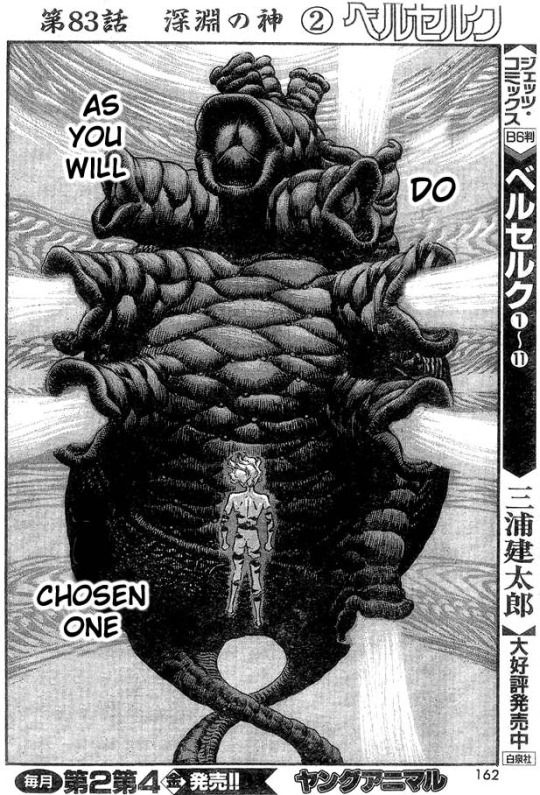
Here he is, at the heart of all evil right after selling the souls of his men for a new body and the kingdom he sought to make. Here he is, learning about the complexities of his universe, of fate itself, and his place in the world, and what is what is Griffith's response to all of this? Is it horror? Disgust at what's going to happen? No... It's this.
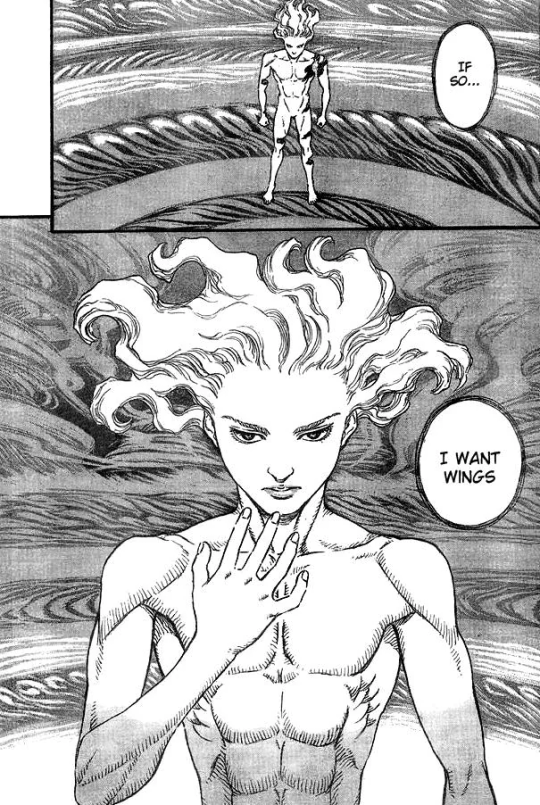
This is such a self-centered, childish, and human response to learning that his entire life and the lives of everyone who has ever lived up to this point was guided by the steady hand of fate. There's something sickening about this being his response to the idea of not being human anymore, to turning into something entirely different from how he was, something beyond monstrous. Yet you can clearly see the thought process behind such a response. You can see he doesn't care about shit anymore because he finally gets to achieve his ambitions without anyone holding him back.



And so, his metamorphosis into a demon is complete. It would be from this point on that Griffith would become the worst possible version of himself that he could be. Every horrible aspect of himself would be enhanced, and he won't even bother putting up any facades. As he flies into the sky with his horrible new form just laser focused on getting everything he ever wanted, including petty revenge on his former friend by making someone else suffer.
In short, underneath all of his layers, it doesn't matter if he's a demon or a man, Griffith is a selfish creature above all else. You may be able to understand how he got to this point, you may pity him at some points, but ultimately you will see that pity is wasted on this selfish being who would walk over your corpse without a second though if it meant attaining his prize.
17 notes
·
View notes
Text
Griffith's Relationships
The White Hawk. The White Phoenix. The King of Falconia. The Savior. Femto. The Blessed King of Longing. Once, the greatest mortal to ever wield a sword. The bane of the Black Swordsman. The most beautiful man alive. Him with a stature nothing short of pure magnificence. You know him. You love to hate him. I’m talking about one of the greatest characters not just in manga, but in all of fiction: Griffith.
Griffith is one of many examples of how masterful Kentaro Miura was with a pen, be it pressing against a notebook or a panel. An incredibly written character, as complex as they can come, with some of the most complicated, deep, and tragic relationships I’ve ever seen put to any form of media.
Here, I’ll be discussing what is inarguably a core tenet of Berserk: Griffith’s relationships. With two exceptions, there is no dispute that Griffith’s relationships are the singular most important part of the media he resides in, there is no debate over whether or not they are still crucial parts of understanding both Guts’ disposition, and the world of Berserk. Griffith’s different approaches to interacting with those in his vicinity warps the very world itself, and his whims shape the very nature of the conflicts the protagonist engages in.
Here, in 6 parts, we will be dissecting Griffith’s most important relationships through Berserk, how they shaped him, and what they explain about who he is and how he got to where he is now.
Part 1: The Boy, and The Hawks
Part 2: The Governor.
Part 3: The King.
Part 4: Charlotte.
Part 5: The Wings of the Hawk (1)
Part 6: The Wings of the Hawk (2)
______________________________________________________________
Part 1: The Boy, and The Hawks
Throughout the story of Berserk, Griffith goes through many changes, some more drastic than others. But no change is more pivotal than the one caused by a certain young bird who flocked with him and the Hawks when he first started his journey. Before Guts, before Casca, Griffith was no one. He was a commoner, no more than a child, starting his own little group of misfit warriors to become… something. Whatever it was, surely, it must set him on the path to his dream. But to the others, whatever that something was did not matter. It was of no consequence to them whether that mystical something ever came into fruition. All that mattered was that Griffith was the one who was pulling them along with him into the smoke that obscured their immediate war-torn futures.
Among them was a young boy. Younger than Griffith, even. So young, he would even bring his toys onto the battlefield. A young boy who admired him from what he thought was afar, but in actuality could be only a few feet away at times. It was like admiring a star, or, as Griffith puts it, “the hero of some story.” A hero not too unlike the toy knight Griffith found one day in his satchel, no owner left to claim it, as he lay on the ground, blood pooling around him as it soaked through his bare clothes, no armor, merely a tunic and a dream. A dream to serve alongside Griffith. A dream to aid Griffith in achieving his dream, a small dream, a dream to aid another man’s story.
Griffith wondered, as he placed the boy’s toy back on his chest, whether, when he died, he felt comfort from his dream. Or, perhaps, did he die in agony, unable to achieve it? Was death the start of a new dream, or the end of all other ones? Was it even the boy’s dream that he felt as he slipped away? Or was it the dream Griffith imposed upon him? He did not know the answers.
But he knew one thing- that he could no longer idly hope for his dream to be achieved. He knew he could not simply throw enough numbers at the board, have enough fights, gain enough men, and maybe he’d get lucky, and his dream would simply fall into his lap. He would have to take initiative. He would have to work for his dream, would have to devote every waking moment, every sleeping moment, to the pursuit of that dream.
One night, later on, upon returning to the castle, Casca finds Griffith with a man known for… having a particular taste regarding young boys. Later on, she finds him, bathing himself in a nearby river. He begins to quite literally tear into himself, ripping open his arm in a perfect metaphor for how he feels. He claims he has logically reasoned out that what he did was necessary in order to make sure that he gets the funds needed to properly helm a militia the size he will require. But this is only after admitting that he feels that he must be as filthy as those who follow him, because he does not deserve to be clean when his dream is smeared in the blood of thousands who follow his words.
Despite his supposed recovery from this mental break, and despite his claims, the scene of that young boy, dead on the battlefield, with his only belonging encapsulating the lofty ideal to which he held Griffith, broke him. It could have, should have broken any man who would be in the same situation. But it did not just break Griffith. It melted him down, only to reforge him again. That young boy pushed Griffith to do whatever it takes to achieve his dreams, and to accept that casualties will occur. It was a notion Griffith accepted, but not one he fully understood until it was there, laid bare in front of him, forcing him to either confront it, or to give up. And Griffith confronted it. And it warped him. As the story progresses, we see that Griffith is still affected by the death of this young boy, and that his blood still stains crimson all of Griffith’s decisions.
Without this death, perhaps Griffith is content to simply grow the Hawks through skirmishes, through battle, and through battle alone, until another opportunity presents itself. Perhaps Griffith does not sleep with the old man. Perhaps Griffith does not engage in the activities he does later on in the story, assassinating rivals in his chase of his dream of a throne. Perhaps he does not pull Guts as his sole equal in the depravity he lowers himself to for his dream, sending him on an assassination mission where Guts has a realization of equal magnitude to his own. But Griffith does not recover from this spiral. Perhaps, if this child did not die as a result of Griffith’s own actions, perhaps The eclipse never occurs. Perhaps Griffith must work ten times as hard, it takes ten times as long, but perhaps Griffith does not become the false emotional stonewall he acts as. Perhaps he gains a new dream, perhaps he does not, but either way, perhaps he can have that journey with those he loves, he values, to keep him company.
And Griffith loves the Hawks. All of them. Perhaps not to the same degree, but for all of them, Griffith feels this same type of patriarchal, shepherd-esque obligation, with perhaps the exception of Guts, and Guts alone. He takes on the burden of making the hard choices, of putting himself through hell, to attempt to mitigate the harm they can potentially receive as much as possible. He bears the weight of every victory, every loss of every individual, all willingly given for the sake of his dream. He alone bears the cross of being the head of the Hawks, at every step of their journey.
And this makes his decision at the Eclipse all the more powerful. Some may think that Griffith made the decision because he did not actually care about the Hawks, those who would so loyally lay down their lives if he were to so much as ask. But no. The thing that makes Griffith’s decision to follow that through, to sacrifice all of the Hawks for the sake of his dream so sickening, so gut-wrenchingly despicable, is that he does care. He values each and every single life that was lost at the hands of the apostles, and the demons that began to ravage his party at his behest. He has to care. After all, the Behelit requires him to sacrifice whatever he values most in order to give him his chance at his dream.
All this death and mayhem, yet underneath it all, it is the scarlet blood of a single child, barely younger than him, that tinges Griffith’s memory.
#griffith#casca#guts berserk#anime discussion#griffith is probably my GOAT villain I'm ngl#character breakdown#berserk#femto#RIP Miura#every time his pen touched paper was a masterstroke
29 notes
·
View notes
Text


If I had a nickel for every time a white-haired complicated/villainous man was involved with a gentle brunette noble woman named Charlotte, I would have two nickels, which isn't a lot, but it's weird that it happened twice.
#felt compelled to make this since I am also a brunette named Charlotte#where is my white-haired complicated/villainous man?#vampire hunter d bloodlust#berserk#griffith and charlotte#charlotte and meier link
15 notes
·
View notes
Text

Griffith's helmet from Berserk.
#berserk#griffith#helmet#armor#skull#villain#Kentaro Miura#Band of the Hawk#digital art#silver#anime#manga#knight
20 notes
·
View notes
Text
Wait...This Exists?!

How did I not know this was a thing sooner?! It’s two years old! Well...I haven’t read any of the “Fables” comics till now, but this has officially jumped up high onto my comic reading list. If you’ve read this already, any of you fellow Big Bad Wolf fans out there, DON’T YOU DARE SPOIL IT FOR ME. XD
#big bad wolf#bigby wolf#fables#wolf among us#batman#dc#crossover#comic#hype post#i guess you could call this?#i hope#mad hatter#is the villain of this story#also if bigby so much as threatens to eat batman#i'm gonna go berserk#XD
155 notes
·
View notes